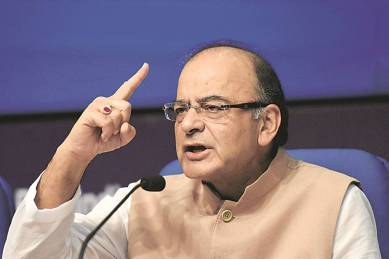Arun Jaitley interview: Huge banking reforms underway, been able to strike consensus on GST Bill
Arun Jaitley on GST bill, jobs, inflation, PPP, banking reforms and RSS' economic views.

Finance Minister Arun Jaitley, in an interview to The Indian Express spoke at length on issues concerning his ministry and the measures being taken by the NDA government to boost the Indian economy.
The interview, which you can read here, is part of an Indian Express Series on 25 years of economic reforms. July marks the 25th year of the historic reforms that set in motion the irreversible process of opening the Indian economy. You can read our entire coverage of the series, here.
monthly limit of free stories.
with an Express account.
Below are key issues that Finance Minister Arun Jaitley spoke about in his interview to The Indian Express.
On employment generation
We have been, in the last two years, passing through a very critical phase. Critical because the global situation is obstructive, not supportive. When the world grows, everybody grows. 2003-09 were positive years of global growth. So, along with the global trend, demand increases, everybody moves up. 2014 onwards, we have been obstructed by global winds. Secondly, we had an inadequate monsoon. Thirdly, the UPA left behind a legacy of large NPAs and a stressed private sector.
Positive in our favour was oil prices, as against these three drawbacks. Now, the first [achievement] was not to get into the global trend, and therefore, these have been the only two years in India’s history — and hopefully there will be more — where we will be the fastest growing economy in the world. And fastest in an adverse environment. Second, this growth is coming on the strength of three factors. Enhanced public investment, foreign direct investment and increased urban demand. Hopefully, this year’s monsoon will add rural demand to it. Now, these collectively may bring some activism into the private sector in many segments. We are independently trying to tackle the banking issues. Therefore, both at the level of areas where the economy grows, jobs are created, and also schemes like Mudra have encouraged a huge amount of self-generated employment.
WATCH: Exclusive interview with Finance Minister Arun Jaitley
Banking reforms
A huge banking reform is taking place in India right now. The 1969 change had left banks predominantly nationalised. Today, as we look at 2016, you have private sector banks in very large numbers. [They are] growing and [their] performance index is very high. You have a very large Internet banking [network]. You have payment gateways now. You have these small bank licences, newer licences, which have been given. And therefore, a large part of India’s banking has now already travelled beyond those nationalised banks. Even the nationalised banks have now learnt a lesson that they will have to be competitive in addition to their social obligations. Now, this low-cost financial inclusion, the whole world is surprised how we did it. A lot of credit goes to the nationalised banks for this.
Insurance, now you will find your consumer industry demands housing, etc. Banking is needed to support growth. What unfortunately has happened is that a few sectors got stressed because of the global slowdown. Power, steel, and even sugar was stressed in India. Now gradually, the stress is going away in some sectors and the government has played a proactive role there. UPA did not take even one step to remove banking stress. All of this was done by us in the last two years. Be it minimum import price for steel, or the Uday scheme for power. We revived highways. We are launching as many infrastructure projects as we can.
Now, for public sector banks, on the one hand you have to inject capital and on the other, remove factors that cause stress. And this whole policy of merger — smaller banks merging into larger banks. So there is a huge amount of banking reform which is taking place in India. It is not necessary that every reform has to be confrontationist in nature.
[related-post]
You always have to balance inflation and growth. You will always need to do that. So if India has a very high rate of inflation, the cost to the common man increases. And thereafter, the rates themselves will go up, because money supply will have to be curtailed, and then that will impact on growth. So the balancing act has to be done by various institutions, including the RBI.
Public Private Partnership
In infrastructure, the PPP model has to be encouraged. Because in infrastructure, government has to partially or substantially lead the way. There is a very strange dichotomy in the public-private relationship. Ordinarily, the private sector should lead the economy. But when there is stress, they want the government to take the first step.
GST Bill
GST was initially proposed by the Congress party in one of Finance Minister P Chidambaram’s Budget speeches. Thereafter, Mr Pranab Mukherjee introduced the Bill. They could not build consensus among the states. With some changes in the law, we have been able to bring about a consensus among the states. Almost all states are now supporting it. Virtually every political party is now supporting it. And the numbers in the Rajya Sabha are stacked in favour of the GST. We are in a position to have even the subsequent laws cleared, two of them by Parliament and one by the state legislatures. The Congress has raised some issues, and I have already made the government’s stand clear. I am in discussions with them, and I hope the Congress party takes a reasonable position.
RSS influence?
There are various sections of people whom we consult for their views on a subject, but ultimately we decide what is in the best interest of the economy.